About Gum Disease
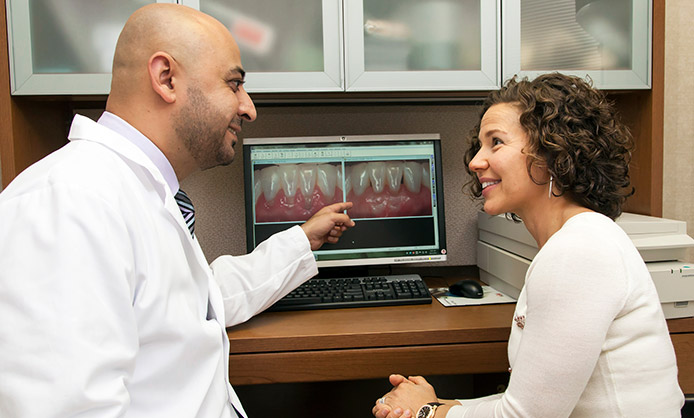
As a periodontists, Dr. Bakuri is specifically trained to diagnose, treat and help prevent gum disease.
What Is Periodontal (Gum) Disease?
Gum disease, or periodontal disease (from perio meaning “around” and dont meaning “tooth”), is a common condition affecting millions of Americans. In fact, it is the number one cause for tooth loss in adults.
Periodontal disease is inflammation of the tissues and bones that surround your teeth. If left untreated, periodontal disease can progress and result in the loss of teeth and bone. Periodontal disease is also a contributing factor in other medical conditions such as heart disease and diabetes.
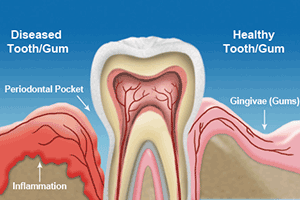
Gum disease is an inflammation of the tissues and bones that surround your teeth.
Periodontal disease is a “quiet” disease. Frequently, there are no symptoms involved, and patients are often surprised to learn that extensive damage can occur without them ever feeling pain or discomfort.
When periodontal disease affects a dental implant, this is known as peri-implantitis, and requires specialized treatment.
Expert Periodontal Treatment
Fortunately, Dr. Bakuri is a skilled specialist in combatting periodontal disease and uses minimally invasive treatments to do so for both natural teeth and dental implants.
Warning Signs of Gum Disease
Indicators that you may have gum disease include:
- Persistent bad breath
- Gums that are pulling away from the teeth
- A change in your bite (how your teeth fit together)
- Teeth that have become loose
- Signs of infection, such as redness, swelling or pus
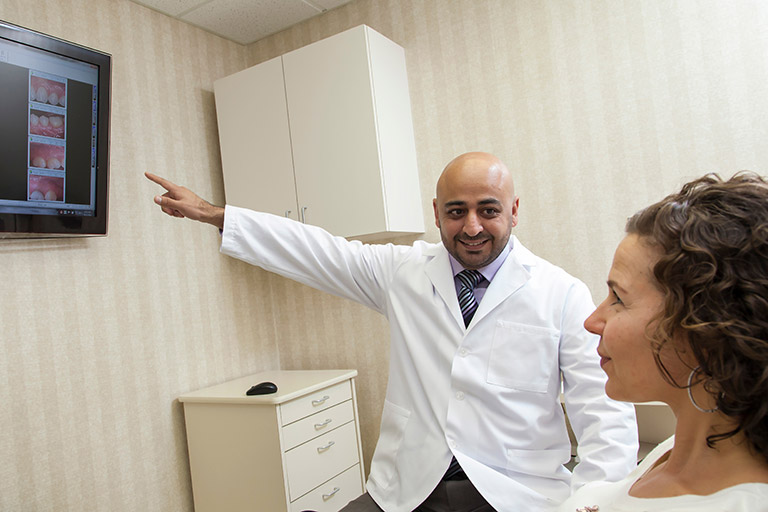
We provide and education of what gum disease looks like and how to spot it.
If you are experiencing any of these signs, call 412-487-8288 or click here to schedule a periodontal exam as soon as possible.
$199 Gum Disease Exam, X-Rays and Consultation
- Comprehensive oral examination
- Full mouth X-rays
- Oral cancer screening
- Consultation with the doctor
- Written treatment plan
Call 412-487-8288 or click here to schedule your appointment.
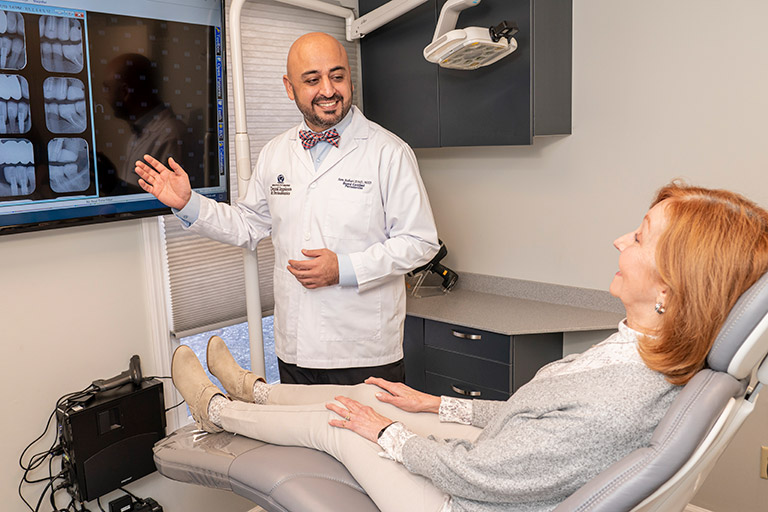
Link Between Periodontal Disease and Systemic Diseases
Periodontal disease is associated with several serious health conditions, such as diabetes, heart disease, stroke, osteoporosis, respiratory disease and cancer.
It was thought that bacteria was the factor that linked periodontal disease to other diseases in the body; however, more recent research demonstrates that the link may have to do with inflammation. Therefore, treating inflammation may not only help manage periodontal disease but may also help manage other chronic inflammatory conditions.
Causes of Periodontal Disease
The most common causes of periodontal disease are genetics, smoking and accumulated plaque bacteria.
Plaque bacteria: Plaque is a sticky, colorless film consisting of bacteria that continually forms on our teeth. If not removed by brushing and flossing, plaque can become tartar, the buildup of which irritates the gums, causing them to become inflamed and retract from the bacteria and the teeth.
Tartar (calculus): This hardened plaque lurks below the gumline and, if not removed, accumulates more plaque and causes loss of bone and tissue support around the tooth.
Poor diet: Lack of proper nutrition may cause chronic adverse conditions, including gum disease. A well balanced diet featuring fresh fruits and vegetables can boost nutritional levels.
Genetics: An estimated 50% of people are predisposed to gum disease. However, proper oral hygiene can keep the disease at bay.
Systemic diseases: Certain systemic diseases may contribute to periodontitis, including diabetes, respiratory disease, heart disease and autoimmune disorders.
Smoking: A recent study indicates that the most damaging types of bacteria are found in the mouths of smokers.
Low quality dentistry: Ill-fitting bridges and crowns may accumulate bacteria beneath their surfaces.
The Stages of Periodontal Disease
Healthy Gums are firm, pink and do not bleed easily. There is no recession of the gums, and teeth are held firmly in place with no damage to supporting bone structure.
Gingivitis is the mildest form of gum disease. It causes the gums to become red, swollen and bleed easily. There is usually little or no discomfort at this stage. Gingivitis is caused by the accumulation of bacteria on the teeth and is easily reversible with professional treatment and good oral home care.
Early Periodontitis: If gingivitis is left untreated, it can advance to periodontitis. In the early stage, periodontal disease begins to destroy the bone and tissue that supports the teeth.
Moderate to Severe Periodontitis can lead to more bone and tissue destruction. The most advanced form of this disease includes extensive bone loss. Teeth often become loose and may have to be removed. Even in the moderate to severe stages there is often no discomfort associated with the disease.
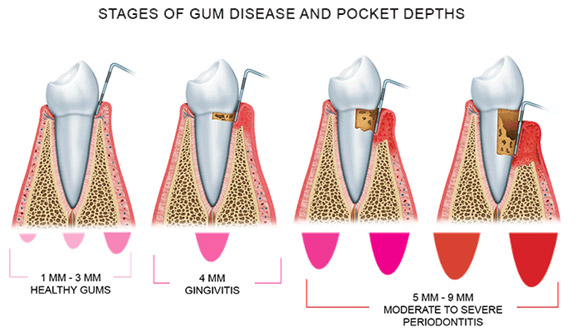
A pocket depth of 1–3mm is healthy; pocket depths of 4mm or more indicate an infection; pocket depths of 7mm or more indicate a higher risk for permanent damage and tooth loss.
Severe Periodontal Disease
Periodontitis causes the gums to separate from the teeth leaving “pockets.” A pocket depth of 7mm or more is indicative of severe gum disease and poses the potential for permanent damage.
The deep pockets trap food and plaque, become irritated and infected, and damage surrounding gum tissue and bone. In the last stages of periodontitis, bone and connective tissue have diminished to the point that they can no longer support a tooth. The tooth will become loose and may need to be extracted.
Controlling Gum Disease
As part of your treatment, we offer comprehensive education on preventing gum disease from recurring.
Learn more about preventing gum disease.
Oral DNA Testing
In some cases, we use a simple saliva DNA test to determine the specific type and quantity of bacteria in your mouth. This technology allows us to precisely diagnosis the exact strain of bacteria that are present and prescribe the appropriate antibiotic. The DNA saliva test can also show if you are resistant to a particular type of antibiotic.
Indications of Oral Pathology or Oral Cancer
Oral pathology pertains to diseases of the mouth. Dr. Bakuri always screens for oral cancer and other signs of disease during your examinations.
The inside of the mouth is normally lined with a special type of skin (mucosa) that is smooth and coral in color, and any changes in this appearance could be a warning sign that a disease is present. The most serious pathology is oral cancer.
The following can be signs at the beginning of a pathologic process or cancerous growth:
- Reddish or whitish patches in the mouth
- A sore that doesn’t heal and bleeds easily
- A lump or thickening on the skin lining the inside of the mouth
- Chronic sore throat or hoarseness
- Difficulty in chewing or swallowing
These changes can be detected on the lips, cheeks, palate and gum tissue around the teeth, tongue, face and/or neck.
Diseases of the mouth don’t always produce painful symptoms and, oddly enough, oral cancer is not usually painful. However, if you have facial and/or oral pain without an obvious cause or reason, you should be examined immediately.
An oral cancer screening is conducted during every cleaning appointment in our office. Remember, your mouth is one of your body’s most important warning systems.
Please do not ignore suspicious lumps or sores!
Call 412-487-8288 or click here to schedule your appointment.


